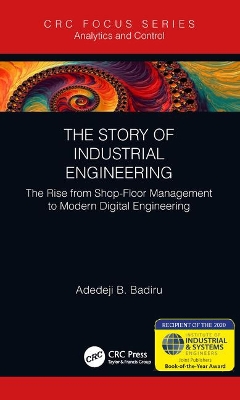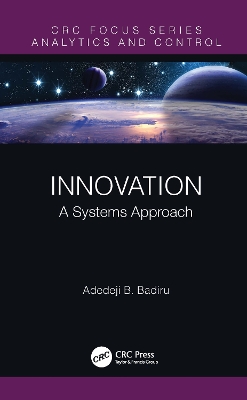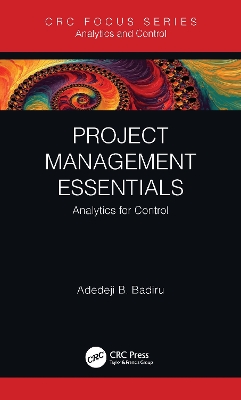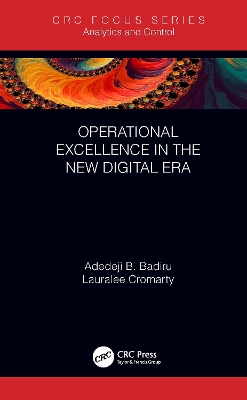Analytics and Control
6 total works
Recipient of the 2020 IISE Institute of Industrial and Systems Engineers Joint Publishers Book-of-the-Year Award
Industrial engineering is the profession dedicated to making collective systems function better with less waste, better quality, and fewer resources, to serve the needs of society more efficiently and more effectively. This book uses a story-telling approach to advocate and elaborate the fundamental principles of industrial engineering in a simple, interesting, and engaging format. It will stimulate interest in industrial engineering by exploring how the tools and techniques of the discipline can be relevant to a broad spectrum of applications in business, industry, engineering, education, government, and the military.
Features
- Covers the origin of industrial engineering
- Discusses the early pioneers and profiles the evolution of the profession
- Presents offshoot branches of industrial engineering
- Illustrates specific areas of performance measurement and human factors
- Links industrial engineering to the emergence of digital engineering
- Uses the author’s personal experience to illustrate his advocacy and interest in the profession
Mechanics of Project Management
by Adedeji B. Badiru, S. Abidemi Badiru, and I. Adetokunboh Badiru
Every organizational endeavor is based on project management. Projects range from simple to complex, with a definite beginning and a definite end. In manufacturing, as an example, the production of each unit of a product is defined as a project. The lifecycle goes from raw material to the product delivery stage, with steps in between managed as a rigorous project. This book covers the mechanics of project management and offers the requirements for executing a project using a systems-engineering framework and the project management body of knowledge, as advocated by the Project Management Institute. It includes the nuts and bolts for untangling the knots that often exist in project execution.
Features
- Offers a unique guide to management projects, both big and small, in all spheres of human endeavor
- Presents the nuts and bolts of untangling the typical knots in project execution in a step-by-step format
- Applies to all types of projects, including technical, manufacturing, financial, science, engineering, and personal projects
- Provides a structured guide to the application of project management techniques
- Uses the Project Management Body of Knowledge (PMBOK) framework from the Project Management Institute (PMI) as the platform for the topics covered, coupled with a systems view
- Addresses technical and managerial aspects of projects in every industry
It is a systems world. This concise book uses a systems-based approach to show how innovation is ubiquitous in all facets of endeavors, including business, industry, government, and academia. The systems approach facilitates process design, evaluation, justification, and integration. This book explicitly highlights the crucial role of integration in any innovation project. It presents conceptual and operational definitions of innovation. Emphasis is placed on the context related to the theme of systems thinking.
Features
- Covers the intrinsic basis for innovation from a systems perspective
- Describes the use of the DEJI systems model for actuating innovation
- Highlights the role of humans in the innovation loop
- Provides guidance for innovation project management
- Presents a case example of linking quality and innovation
- Introduces the Umbrella Theory of Innovation
Although most agree that Lean Six Sigma is here to stay, they also agree that learning how to sustain the results seems problematic at best and unattainable at worst. Reverting to the old way of doing things is inevitable if sustainability measures are not a part of the methodology. Currently there are no standard resource on how to be sustainable or on using statistical techniques and practices. Until now. Sustainability: Utilizing Lean Six Sigma Techniques not only examines how to use particular lean six sigma tools, but how to sustain results that make companies profitable with continuous improvement.
The book demonstrates how to use the Six Sigma methodology to make process-focused decisions that will achieve the goals of sustainability and allow organizations to gain true benefits from process improvements. It covers sustainability and metrics, Lean manufacturing, Six Sigma tools, sustainability project management, sustainability modeling, sustainable manufacturing and operations, decision making, and sustainability logistics. These tools help sustain results while keeping organizations competitive regardless of economic conditions.
While continuous improvement techniques look good on paper, the implementation of the techniques can become difficult and challenging to maintain. Without utilizing Lean Six Sigma tools and leading the change, companies will become less and less marketable and profitable. This book supplies a blueprint on achieving sustainable results from high-quality improvements and making organizations competitive and first in class in their marketplace.
This Focus book presents the basic principles and practice of project management and simple analytics for project control, using the systems framework of Design, Evaluation, Justification, and Integration (DEJI). The overriding theme of the book is that every pursuit can be organized as a project.
This short form book presents the evolution of products in the classical era of introducing new projects needing project management. It discusses the development of project alliances, includes the role of project management in advancing organization goals, illustrates the early applications of project management, and includes humans in the loop. The book will also cover project systems and work design, while showing the integration of quantitative and qualitative analytics.
This book can serve as a reference for everyone, since everyone is engaged in project management, whether formal or informal
Operational Excellence in the New Digital Era
by Adedeji B. Badiru and Lauralee Cromarty
Operational excellence, as a quest in the prevailing digital era, is predicated on a systems view of the operating environments in business, industry, government, academia, and other organizational entities.
This book uses a systems-based approach to show how operational excellence can be pursued, achieved, and sustained. It offers a systems perspective for operational excellence and discusses the evolution of products from the classical operation era to present day digital operations. It covers the role of global markets on domestic operations, presents operational work design and ergonomics, and combines industrial engineering, advanced research, and practical experience.
This book is a useful guide for scholars, practitioners and those involved in engineering, management, and business fields.





